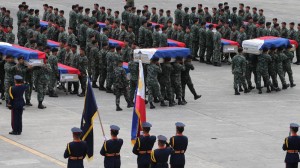His absence speaks louder than words
NEW YORK CITY — My thoughts have lately been turning to war, and war there is aplenty. In Iraq and Syria, the barbaric band of misanthropes calling itself the Islamic State holds on to a large swath of territory, beheading its captives and in the instance of the captured Jordanian pilot burning him alive. In Ukraine, Russian-backed separatists and government forces battle it out. And the Boko Haram is bedeviling northern Nigeria and the countries that border it.
My thoughts are especially drawn to seemingly endless armed conflicts, as the first week of February is the occasion for at least two anniversaries: the 70th of the month-long Battle of Manila, that raged from February to March 1945. The other anniversary is that of the 1899 Philippine-American War, the 116th, with the first shots fired on February 4, 1899. The bluecoats were invaders, an illegal and immoral occupation force imposing themselves on a nation that had in June of 1898 declared its independence and wished to rid its shores of foreign armies.
The battle for control of Manila was fierce and apocalyptic. The Japanese defenders dug in their heels and fought the advancing U.S. forces street to street, building to building, in the process killing anyone and everyone they encountered. Most of the slain were Filipino civilians, who just wanted to get out of harm’s way but instead ran right into it. For its part, the U.S. Army brought in their big guns and essentially leveled the Old Walled City and much of its environs.
The city, caught between a rock and a hard place, was obliterated. The noble and loyal Manila, founded in 1572, once glamorous and charming, was now a smoking charnel house. The carnage and destruction meant that the city was the most damaged, after Warsaw, though this distinction must be qualified by pointing out Manila’s destruction could not equal the horrors visited on Hiroshima and Nagasaki by A-bombs, in August that same year.
By 1945, the image of the US.= had turned so that its soldiers were now seen as liberators—witness the term “Liberation” to describe that period. The ambivalence and wariness of the islanders towards the Yankees had changed in large part due to the deprivations, brutality, and atrocities perpetrated by the Japanese on the civilian populace.
The blame for the city’s holocaust was laid at the Tiger of Malaya, General Tomoyuki Yamashita’s feet, although when the battle began, he was in the Cordilleras, and had left the defense of Manila to Rear Admiral Sanji Iwabuchi. Credible accounts point directly to Iwabuchi’s command to defend the city to the death, rather than proclaim it an open city. Nevertheless in a three-week trial ordered by MacArthur, Yamashita was found guilty and executed near Manila on February 23, 1946. What was the general doing in the mountains? The official reason was that there he would offer fierce resistance and delay as much as possible the advance of the U.S. on his homeland. The unofficial reason? That under his command, gold and other valuable gems looted from various Southeast Asian countries were being hidden in secret places, to be retrieved later on. But that’s another story.
Article continues after this advertisementAnd then there is the quagmire that is southern Mindanao.
Article continues after this advertisementThe latest grim evidence of this: the deaths of 44 Special Action Forces at the hands of the Moro Islamic Liberation Front and the Bangsa Moro. What a terrible, tragic waste of life!
I watched a video put out by the Philippine Air Force that documented the return of the slain to Villamor Air Base, in a somber ritual that the producers were wise enough to let speak for itself, sans intrusive narration. I kept looking for the one individual who was supposed to be on hand for the arrival of these bodies, and to lend some consolation to the grieving families. He was nowhere to be seen.
Where was the president of the republic, the commander-in-chief of the armed forces? Was there any question, any doubt, that he had to be there, to lend the weight of his presence and the symbol of his office to the occasion and lead the nation in mourning? What sort of advisers does he have? Did no one tell him, Mr. President, those families need you, the men that you command need you, the nation you swore to protect and to serve, needs you. Did he need anyone’s advice that the deaths of these men under his command demanded his being there to receive them? Being there and offering up a heart-felt eulogy for them. Simple enough but apparently too much for PNoy.
While the deaths of the 44 justly claim our mourning, we should also remember all those who preceded them, whether civilian or soldier or guerrilla, whether Muslim or Christian—nameless except to their families. They too deserve a moment of remembrance. All these deaths make it all the more imperative for a lasting peace to be secured. The cynics and the skeptics and those eager for revenge may say it’s a dream. Yes, it is a dream but only in attempting to attain our dreams do we become human.
Copyright L.H. Francia 2015
